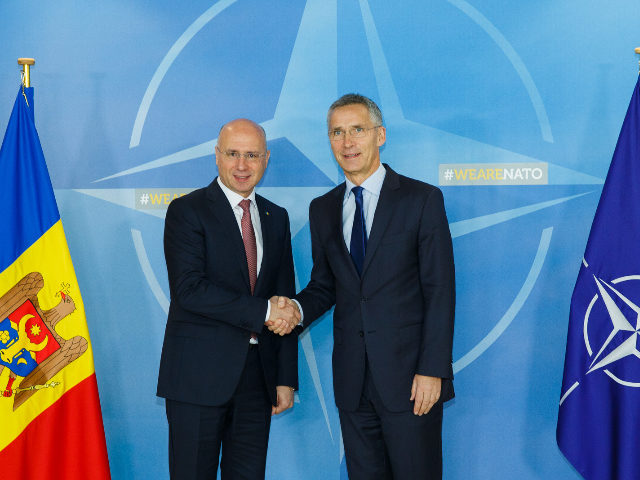
Moldova’s Cooperation With NATO—Strategic Choice or Political Tactic?
Publication: Eurasia Daily Monitor Volume: 15 Issue: 19
By:

Between January 29 and February 2, a group of experts from the North Atlantic Treaty Organization (NATO) visited Moldova to assist with the drafting and implementation of the country’s key strategic documents, including the national defense and military strategies as well as related action plans. This visit was part of NATO’s Defense Capacity Building Initiative for the Republic of Moldova (DCBI), which was launched in 2015 and is now nearing the end of its first phase. The Moldovan Ministry of Defense is hoping to soon begin the second phase of the DCBI, which would entail actual training for the various branches of the Armed Forces (Army.md, January 29). However, in order to be promoted to the second phase, the Moldovan government needs to show a political commitment to boost the country’s defense capacity, which is best reflected in a higher defense budget. Yet, even if the cash-strapped government were to find the resources to increase defense spending—a problematic proposition in an election year—all 29 North Atlantic Alliance members will still need to approve the second phase of Moldova’s DCBI. Needless to say, in the current regional geopolitical context and given Moldova’s domestic political uncertainties, some NATO countries may have their reservations.
Surprisingly, in light of Moldova’s defense vulnerabilities, including a frozen conflict in Transnistria, the county’s defense spending has never been a cause of major public debate. The defense budget went up during the time the Party of Communists (PCRM) was in power, reaching 0.61 percent of GDP in 2008—the highest point to date. The same year, the parliament approved the National Security Concept, which, while emphasizing military neutrality, listed separatism, inter-ethnic tensions, terrorism and energy dependence on one supplier among key security threats (Lexjustice.md, May 22, 2008). However, defense was not among the priorities of the pro-European coalition that came to power in 2009: spending on defense again began to decrease, reaching just 0.27 percent of GDP in 2011 (Expert Grup, April 2016). Even after Russia’s annexation of Crimea and the ongoing war in Donbas, Moldova’s defense spending hovered at 0.42 percent in 2016 and 0.40 percent in 2017 (Gov.md, 2017). The national defense budget for 2018 was set at only 0.39 percent of GDP, way under the 2008 high-water mark, even in absolute terms (Viitorul.org, December 21, 2017). This is unlikely to signify to the Alliance a significant political commitment by Chisinau to launch the second phase of the DCBI. Therefore, the Moldovan government is presently trying to prove its commitment and pro-Western credentials by other means.
After appointing a pro-Western defense minister, albeit under controversial circumstances (see EDM, November 16, 2017), the government then approved the long-overdue updated National Defense Strategy (NDS) and action plan for 2017–2021. Meanwhile, the National Security Strategy developed under President Nicolae Timofti remains on hold after President Igor Dodon withdrew the document from consideration (Realitatea.md, June 27, 2017). Among the priorities of the NDS are providing the Armed Forces with modern equipment and training, reviewing the force structures and their responsibilities, as well as harmonizing national defense legislation with European norms (Gov.md, November 1, 2017). Yet, acquiring modern military equipment will be a challenge as spending barely covers the up-keep costs of the country’s defense system. The government will have to rely on donations from international partners, hardly a sustainable way of building defense capabilities, particularly as Moldova finds itself in a diplomatic row with Russia, which has increased the intensity of its military drills in Transnistria (Mil.ru, December 19, 2017).
After the ruling Democratic Party expelled five Russian diplomats on espionage charges in May and declared Russian Deputy Prime Minister Dmitry Rogozin persona non grata in August, the Democratic Party–controlled majority has just banned news and political talk shows from countries that have not ratified the European Convention on Transfrontier Television (ECTT)—mainly, Russia and a couple of European Union members. The legislative majority in Chisinau is now mulling over the idea of sending Russia a bill for occupying Moldovan territory for 25 years (Zdg.md, January 12; Noi.md, January 18). Moscow’s only official response so far has been a declaration of condemnation, approved by the lower house of the Russian parliament (RIA Novosti, January 24).
Ironically, some Russian lawmakers suggested that the Russian state-owned TV channel Perviy Kanal (Channel One) terminate its rebroadcasting contract with the leader of the Democratic Party, oligarch Vlad Plahotniuc (Pnp.ru, January 24). Speculation is rife that Plahotniuc’s highly profitable contract with this Russian state-owned propaganda machine was coming to an end and was unlikely to be renewed, so the Moldovan oligarch-turned-politician decided to extract some political dividends from an otherwise loosing situation. In fact, this entire anti-Russian propaganda crusade may be futile, since Russian propaganda tools registered in countries that have ratified the ECTT may continue to broadcast propaganda into Moldova. Needless to say, if Russia ratifies the said Convention, Moldova’s recent ban becomes void. Also, TV propaganda embedded in non-political content, satellite TV and Internet sites remains unaddressed (Zdg.md, January 12). This indicates that, instead of a genuine fight against Russian propaganda through courts and regulations, the Democratic Party’s efforts mask ulterior motives of exploiting anti-Russian rhetoric to boost Plahotniuc’s questionable pro-Western credentials (see EDM, January 30) both domestically and internationally during a crucial electoral year.
A recent poll commissioned by the NATO Center in Moldova showed than only 27 percent of respondents know about the organization (Nato.md, February 6). Thus, lack of information about NATO is as much, if not more, of a problem as misinformation on the subject. Combating undue Russian influence and propaganda is important, but without having a serious public discussion about Moldova’s commitment to boost defense capabilities and address the country’s neutrality status in line with increased cooperation with NATO, the subject will remain an electoral bargaining chip rather than a strategic national choice.



